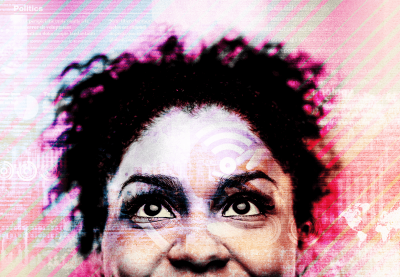Through conversations with scholars, educators and other experts, host Monita Bell explores the critical aspects of digital literacy that shape how we create and consume content online. Discover what we all need to know—and how we can all become safer, better informed digital citizens.
Episodes
Listen to each episode individually, or subscribe for automatic downloads using:
Apple iTunes | Google Music | Spotify | RSS | Help
Episode One: The Digital Literacy Universe
Digital citizens need digital literacy. But what does this mean, and how is it different from traditional media literacy? Experts Matthew Johnson and Shana White map the landscape and give critical advice to teachers.
Episode Two: Understanding Cognitive Bias
Ever get fooled online? It might be because of the way your brain works. Professors Steven Sloman and Lisa Fazio describe cognitive biases and give advice to help students recognize and overcome common errors.
Episode Three: Did You Google It?
Search results aren’t neutral. Sometimes they can lead us to misleading and even hateful parts of the internet. Safiya Noble and Heidi Beirich explain how this happens and what we can do about it.
Bonus Episode: The Roots of Digital Literacy
Where did media literacy even come from, and how are its original aims relevant today? Tessa Jolls, president of the pioneering Center for Media Literacy, breaks it all down in this special episode.
Episode Four: Digital Literacy in the Classroom
Think “digital natives” don’t need digital guidance? Think again. Researcher Sam Wineburg and educator Rafranz Davis bust that myth and discuss ways to help students exercise their power.
Episode Five: Digital Literacy and Youth Civic Engagement
Social media sometimes reveals the worst of humanity. But we also see people—especially youth—using it for necessary change. Erica Hodgin and Joe Kahne talk empowerment and civic engagement through digital media.
Episode Six: Media Manipulation
This isn’t partisan; it’s true—hateful ideas from the far right are increasingly becoming mainstream, and they’re spreading via the internet and digital media. Will Sommer and Melissa Ryan explain how it’s happening.
Coming Soon: The Ins and Outs of Social Media (and More)
New episodes are on the way soon. While we're taking a short winter break, get a sneak peek at what's coming up while you catch up with the rest of our family of podcasts.
Episode Seven: Librarians: Digital Literacy Experts
Too many schools don’t have librarians, but if yours does and you’re not tapping their expertise to teach digital literacy, you’re making a big mistake. Librarians Julia Torres and Lois Parker-Hennion explain why you need them.
Episode Eight: YouTube: Consumers and Creators
Your students are likely experiencing the good and the bad of YouTube, one of the world’s most popular online platforms. In this episode, featuring science teacher Alicia Johal and the Daily Beast’s Kelly Weill, we consider both in the classroom context.
Episode Nine: Fake News: Finding It, Fighting It
Do you know how to identify fake news? MediaWise’s Katy Byron discusses teaching students how to determine what’s real on the internet, and Professor Gordon Pennycook exposes why people believe things that aren’t true.
Episode Ten: Gaming: Reading, Writing and Radicalization?
Video games in the classroom can help young people learn a wide range of skills. But gaming can also expose them to radical ideologies. We talk about game-based learning with Meenoo Rami, manager for Microsoft's Minecraft Education. We also explore how educators can counter hateful messages in games with Keegan Hankes from the Southern Poverty Law Center's Intelligence Project.
Episode Eleven: You Are the Product
Reflections on how the attention economy affects social media and journalism, with Meredith Broussard, author of Artificial Unintelligence: How Computers Misunderstand the World, and Betsy O’Donovan, assistant professor of journalism at Western Washington University.
Episode Twelve: The Digital Literacy Framework
In this final episode, highlights from our guest interviews walk listeners through the seven key areas of Learning for Justice’s Digital Literacy Framework.
